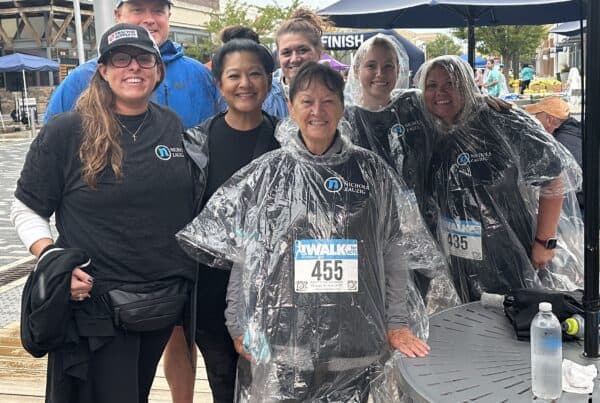If you or a loved one is suffering a Traumatic Brain Injury due to medical malpractice or an accident, your lives have turned upside down. Medical and care expenses are overwhelming. So is the emotional impact on your family.
During this time, it important to find an experienced personal injury/medical malpractice attorney you can trust. To take the weight off your shoulders. To effectively stand up to those who changed your family’s future.
What insurance companies count on
In order to avoid any long-term financial obligations, insurance companies routinely deny the claims of moderate brain injury victims. Since emotional or cognitive difficulties can’t readily be displayed to a courtroom, insurance companies counton victims to be afraid to stand up for themselves.
What you can count on
Nichols Zauzig has made standing up to the bullying tactics of insurers a priority. We have years of experience in helping injured Virginians obtain fair and decent settlements from insurance companies, as well as experience in taking cases all the way to trial.
For our cases involving medical malpractice or spinal and brain injuries, we routinely confer with some of the foremost medical experts in the country and use their testimony to help make the injuries of our clients as clear as possible to insurers, arbitrators, and juries.
Why related experience matters
Nichols Zauzig has been helping bring hope to families like yours for more than 30 years. We have a national reputation in this type of work and have had some of the highest number of million-dollar settlements in Virginia over the past many years.
We have knowledge of the physiology of the brain and the unique legal issues that arise in brain injury cases. This experience is invaluable in cases like yours, because the party you are up against will try any possible avenue to avoid liability.
Common defenses
Common defenses used to deflect responsibility for Traumatic Brain Injury are:
- Contributory negligence
This is the most common defense and it attempts to put all or part of the blame on you, the plaintiff. In Virginia, if the plaintiff is found to share any of the blame in the accident, compensation recovery from the defendant is not possible.
- Assumption of risk
In this defense, the defendant claims the plaintiff should have known about the danger of the injury and cannot recover damages.
- Pre-existing injuries
Defense attorneys and insurance companies argue that the plaintiff is trying to seek compensation from a previous accident or injury.
This is just a sampling of the issues that arise in Traumatic Brain Injury claims. At Nichols Zauzig, during your free initial case review, we will be sure your situation meets the criteria for a legitimate claim.
To begin with, it’s important to understand what Traumatic Brain Injury is and the potential levels of damage.
What Traumatic Brain Injury is
Traumatic Brain Injuries (or TBI’s) occur when the victim receives a sudden blow to the head, which causes an intracranial injury. This trauma causes damage to the brain, which can affect the victim in any number of ways.
It is fairly common
Although it’s easy to assume that TBI’s are rare, they actually happen with alarming frequency. Approximately 1.4 million people per year are hospitalized with Traumatic Brain Injuries, with 235,000 people requiring long term hospitalization and 50,000 people ultimately dying from them.
Causes of Traumatic Brain Injury
Although it’s possible to receive a traumatic brain injury anywhere at any time, the main causes of TBI are:
- falls (28%)
- motor vehicle accidents (20%).
A blow to the head doesn’t have to be severe to cause damage to the brain. Even minor concussions can cause physical, emotional and cognitive problems among the victims. But those that suffer moderate or severe TBI’s can almost count on suffering from long-lasting effects.
Levels of Traumatic Brain Injury
Mild Traumatic Brain Injury
This injury occurs when someone is dazed, confused or loses consciousness for a very short time; a few seconds to a few minutes. Even though testing or scans of the brain can have normal results, it can still be deemed a mild traumatic brain injury, also known as a concussion.
Moderate Traumatic Brain Injury
A moderate TBI occurs when the victim suffers from unconsciousness that lasts from a few minutes to a few hours. Getting hit hard enough to get knocked out is usually a sign that there has been some damage to the brain. A sense of confusion can last in the victim for days or weeks. Physical, cognitive or emotional difficulties can either last for months or be permanent.
While it is true that many victims of moderate TBI’s can learn to cope with the after effects, it doesn’t mean that they can simply return to their lives as if nothing had happened. If the intricate and expansive geography of the brain is damaged or disrupted, there is no such thing as a simple recovery.
- How do you go back to being a teacher if you have a loss of emotional control?
- How do you go back to driving a taxi or working construction if you have difficulties with spatial relations and depth perception?
- How do you go back to being an air traffic controller if your ability to see or hear has been altered?
A traumatic brain injury could be moderate, but the consequences could be severe.
Severe Traumatic Brain Injuries
When the trauma to the brain is much more extensive, the consequences are that much more severe. Brain function can range from none at all (brain death) to minor response to stimulation (minimally responsive state.) The financial costs of such an injury are enormous to a family, and they often lead to painful and combative decisions that can tear a family apart.
Be taken seriously
If you or a loved one has suffered from a traumatic brain injury, and feel that your needs are not being taken seriously by the insurance companies, contact our offices for a free legal consultation today.
Ready to get in touch? Contact Us Today
NEWS & RESOURCES









Ready to get in touch? Contact Us Today
RESOURCES











